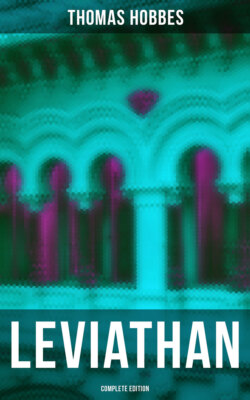Читать книгу LEVIATHAN (Complete Edition) - Thomas Hobbes - Страница 5
Chapter I.
Of Sense
ОглавлениеCONCERNING the thoughts of man, I will consider them first singly, and afterwards in train or dependence upon one another. Singly, they are every one a representation or appearance of some quality, or other accident of a body without us, which is commonly called an object. Which object worketh on the eyes, ears, and other parts of man's body, and by diversity of working produceth diversity of appearances.
The original of them all is that which we call sense, (for there is no conception in a man's mind which hath not at first, totally or by parts, been begotten upon the organs of sense). The rest are derived from that original.
To know the natural cause of sense is not very necessary to the business now in hand; and I have elsewhere written of the same at large. Nevertheless, to fill each part of my present method, I will briefly deliver the same in this place.
The cause of sense is the external body, or object, which presseth the organ proper to each sense, either immediately, as in the taste and touch; or mediately, as in seeing, hearing, and smelling: which pressure, by the mediation of nerves and other strings and membranes of the body, continued inwards to the brain and heart, causeth there a resistance, or counter-pressure, or endeavour of the heart to deliver itself: which endeavour, because outward, seemeth to be some matter without. And this seeming, or fancy, is that which men call sense; and consisteth, as to the eye, in a light, or colour figured; to the ear, in a sound; to the nostril, in an odour; to the tongue and palate, in a savour; and to the rest of the body, in heat, cold, hardness, softness, and such other qualities as we discern by feeling. All which qualities called sensible are in the object that causeth them but so many several motions of the matter, by which it presseth our organs diversely. Neither in us that are pressed are they anything else but diverse motions (for motion produceth nothing but motion). But their appearance to us is fancy, the same waking that dreaming. And as pressing, rubbing, or striking the eye makes us fancy a light, and pressing the ear produceth a din; so do the bodies also we see, or hear, produce the same by their strong, though unobserved action. For if those colours and sounds were in the bodies or objects that cause them, they could not be severed from them, as by glasses and in echoes by reflection we see they are: where we know the thing we see is in one place; the appearance, in another. And though at some certain distance the real and very object seem invested with the fancy it begets in us; yet still the object is one thing, the image or fancy is another. So that sense in all cases is nothing else but original fancy caused (as I have said) by the pressure that is, by the motion of external things upon our eyes, ears, and other organs, thereunto ordained.
But the philosophy schools, through all the universities of Christendom, grounded upon certain texts of Aristotle, teach another doctrine; and say, for the cause of vision, that the thing seen sendeth forth on every side a visible species, (in English) a visible show, apparition, or aspect, or a being seen; the receiving whereof into the eye is seeing. And for the cause of hearing, that the thing heard sendeth forth an audible species, that is, an audible aspect, or audible being seen; which, entering at the ear, maketh hearing. Nay, for the cause of understanding also, they say the thing understood sendeth forth an intelligible species, that is, an intelligible being seen; which, coming into the understanding, makes us understand. I say not this, as disapproving the use of universities: but because I am to speak hereafter of their office in a Commonwealth, I must let you see on all occasions by the way what things would be amended in them; amongst which the frequency of insignificant speech is one.
